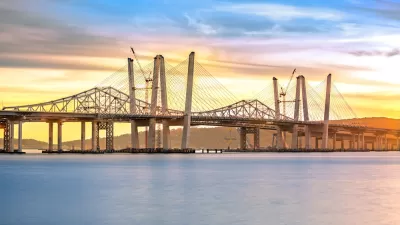New York State received good news on Oct. 31: A $1.6 billion loan has been approved toward the $4 billion replacement of the Tappan Zee Bridge. The remainder will be borrowed from the private sector. A commission will offer ways to repay the loans.
While news of approval of the low-cost Transportation Infrastructure Finance and Innovation Act (TIFIA) loan from the U.S. Department of Transportation was no doubt well-received by the New York State Thruway Authority (see press release), it still left them with the problem of working out how the the loans will be repaid. Buffalo News reporter, Tom Precious, whose readers are probably more concerned about whether tolls on their portion of I-90 on the Thruway will increase to repay the loans, writes:
Asked if a determination had been made to have bridge users pay for the construction or to spread it out across the Thruway system, [Gov. Andrew] Cuomo said he is awaiting recommendations from a commission that was created to look at various financing ideas.
Later, a Cuomo spokesman, seeking "to end any worries that Thruway tolls on the entire system will rise...", stated that there were "no plans for other Thruway users to pay for the bridge’’. Similarly, a plan to raise tolls on trucks was scrapped after push back from industry groups, writes Precious.
And what about upping the tolls on the 138,000 bridge users? Precious writes that "original estimates when the project was first projected to cost $5 billion had bridge tolls nearly tripling to $14 each way".
Uncertainty over how to finance the construction has already led a "Wall Street ratings agency (to) lower the credit rating on Thruway borrowings this week, in part, because of uncertainty over toll increases and the federal loan level."
Not ruled out is charging all New Yorkers by using "the state’s budget to help pay for some of the bridge’s costs," writes Precious.
Contrast the uncertainty that the Thruway Authority and New York State is showing in the $4 billion to $5 billion Tappan Zee Bridge project with Virginia's $2 billion tunnels project which is in the hands of a public-private partnership. A toll schedule has already been approved to commence Feb. 1, writes The Virginia-Pilot's Dave Forster:
The all-electronic tolls will start at $1.84 for passenger vehicles and $7.36 for trucks during peak travel times, with Elizabeth River Crossings able to increase the amount by at least 3.5 percent a year beginning in 2016. The fees will be higher for motorists who decline to sign up for an E-ZPass account.
Being a public-private partnership, Elizabeth River Crossing's "58-year contract allows it to make an average annual profit of 13.5 percent on its investment," writes Forster.
FULL STORY: Thruway users here may help fund Tappan Zee bridge

Maui's Vacation Rental Debate Turns Ugly
Verbal attacks, misinformation campaigns and fistfights plague a high-stakes debate to convert thousands of vacation rentals into long-term housing.

Planetizen Federal Action Tracker
A weekly monitor of how Trump’s orders and actions are impacting planners and planning in America.

Chicago’s Ghost Rails
Just beneath the surface of the modern city lie the remnants of its expansive early 20th-century streetcar system.

Bend, Oregon Zoning Reforms Prioritize Small-Scale Housing
The city altered its zoning code to allow multi-family housing and eliminated parking mandates citywide.

Amtrak Cutting Jobs, Funding to High-Speed Rail
The agency plans to cut 10 percent of its workforce and has confirmed it will not fund new high-speed rail projects.

LA Denies Basic Services to Unhoused Residents
The city has repeatedly failed to respond to requests for trash pickup at encampment sites, and eliminated a program that provided mobile showers and toilets.
Urban Design for Planners 1: Software Tools
This six-course series explores essential urban design concepts using open source software and equips planners with the tools they need to participate fully in the urban design process.
Planning for Universal Design
Learn the tools for implementing Universal Design in planning regulations.
planning NEXT
Appalachian Highlands Housing Partners
Mpact (founded as Rail~Volution)
City of Camden Redevelopment Agency
City of Astoria
City of Portland
City of Laramie



























